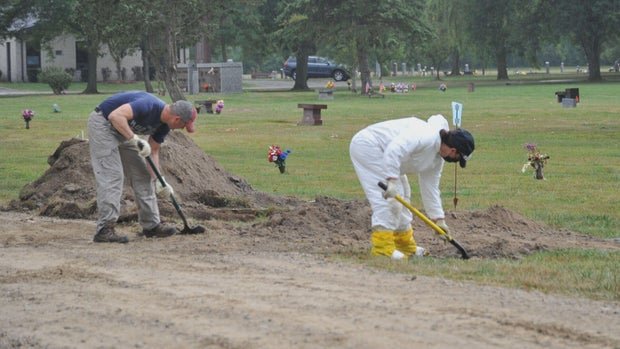
Kristina Morris never knew what happened to her father.
He disappeared in 1995 when her mother was five months pregnant with her. All she had was faded photographs, family stories and endless questions. She yearned for answers to her father’s mysterious disappearance. As a child, she even fantasized that her father worked undercover for the FBI and couldn’t disclose his whereabouts.
“‘Unsolved Mysteries’ became one of my favorite shows,” Morris said in a recent interview with CBS News.
Then in 2018 she got a call from Sgt. Shannon Jones of the Detroit Police Department. Her father’s remains were found at a cemetery just north of Detroit in a grave shared by other unidentified crime victims. Morris’s father, Bryan Fleeman, had been murdered.
Solving that mystery might never have happened if Jones hadn’t found inspiration five years ago while staring at photographs of missing loved ones. Jones, who runs the Detroit PD’s Missing Persons Unit, thought that perhaps clues to her overwhelming case load were buried underground. Literally.
“When I first said it, I thought it was crazy,” Jones told CBS News.
She knew Detroit had historically buried unknown crime victims in so-called “paupers’ graves” in cemeteries across the city. There were a total of about 200 cold cases in Detroit that Jones had documented that went back to as far as 1959.
To Jones, these cases weren’t just about police work. They were about restoring the victims’ humanity.
“Giving them their name,” she said. “And for families to be able to have somewhere to go now and talk to their loved ones.”
Jones’s plan: dig up the missing and run their DNA to search for matches. But she needed assistance in executing her plan. That kind of large-scale exhumation project required technology and resources Jones didn’t have.
She turned to FBI Special Agent Leslie Larsen, an expert in evidence recovery at the FBI Detroit Field Office.
“My first thought was I’m all in, let’s get organized and let’s go dig,” Larsen told CBS News. “Why not use the resources that we have in our criminal laboratories, which are phenomenal, to take science and apply it to old cases.”
The veteran FBI agent said, to her knowledge, no one in the country had done a mass exhumation project of this scale. The two women, Jones and Larsen, were intent on being the first.
They pored through dusty case files in the basement of the Detroit PD trying to learn as much background as they could about the unidentified bodies they were digging up. Some of the cold cases dated back 30 or 40 years, long before DNA analysis was available.
The FBI techs took DNA from the unidentified remains and ran them through online databases of at-home genetic testing firms or compared them to DNA samples that relatives provided directly to law enforcement.
“When you get that lab report back with someone’s name on it, that is absolutely a powerful feeling, for sure,” Larsen said.
The two women named their operation UNITED, which stands for Unknown Names Identified Through Exhumation and DNA. To date, Operation UNITED has resulted in 33 positive identifications of people whose disappearance had left family members in anguish.
Other cities across the country have reached out to them, wanting to launch similar projects.
“I’ve had people reach out from all over the country asking to bring Operation United to their cities,” Larsen said, noting she’s gotten requests from departments in Texas, Colorado and Minnesota.
Kristina Morris’s father was one of the victims identified through the UNITED project. His remains had been buried in one of the shared unmarked graves. Now there is an active homicide investigation into his murder.
“It’s a lot easier to breathe … [knowing] he didn’t up and leave,” Morris said. She mourns his loss, but found solace that he had not abandoned their family.
If it hadn’t been for the work of a committed Detroit police sergeant, Morris said, “I would’ve gone my whole life drowning in the unknown.”